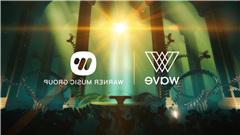Virtual entertainment company Wave has entered a content and investment partnership with Warner Music Group (WMG), the companies tell Rolling Stone. The move brings artists and resources from one of the world’s three largest music companies to the startup, while giving WMG a minority stake in Wave along with access to more virtual concert opportunities for its clients.
“We’re excited to work with Warner as the market progresses to make sure we’re just maximizing value for artists and rights holders,” Wave founder and CEO Adam Arrigo tells Rolling Stone. “Warner’s been really smart in how they’ve leaned into startup innovation and made a number of investments in the space, including us. The music industry has always had a difficult relationship with technology and disruption. I think it’s historic when I see Warner making early investments in technology startups or signing partnerships that are as paramount as the one we just signed.”
Related Stories
A Ride on Peloton's New Warner-Soundtracked Scenic Trails
Tencent Music and Warner Music Will Launch a Record Label in China
Related Stories
Lady Gaga's 'Born This Way': Much Better Than 'Express Yourself'
25 Essential Prince Songs
Wave’s partnership with WMG comes from a years-long relationship between the two companies. Arrigo gave demos to WMG’s corporate team in 2016 when Wave was only a virtual reality (VR) company, giving WMG CEO Steve Cooper his first VR experience, according to Arrigo. Since then, the companies have spoken with one another frequently and established the new strategic partnership to put on shows at scale rather than one-off experiences.
The WMG and Wave teams declined to give financial specifics on the investment beyond noting that the partnership is a “significant” minority deal. In addition to the cash transaction involved, Warner will funnel talent from its four flagship labels — Atlantic, Warner, Elektra and Parlophone — to Wave for more virtual concerts.
The companies haven’t unveiled who will be putting on Wave shows, but the teams say it’ll be a mixture of developing and high-profile acts. Some of the artists across WMG’s labels include Lizzo, Ed Sheeran, Bruno Mars, Roddy Ricch and Panic! At The Disco. Wave and WMG are also still determining the financials on the shows — like whether they’ll be free or ticketed, or what sorts of in-concert sponsorships and microtransactions will be available.
While virtual-concert platforms like Wave saw a flood of new interest from the music industry in the year of quarantine, Arrigo expects immersive streaming platforms like Wave to stick around post-pandemic, because artists will still be looking for alternate ways to engage with fans and promote their music.
Oana Ruxandra, WMG’s chief digital officer and executive vice president of business development agrees, telling Rolling Stone the team is coordinating with its label heads and marketing executives along with Warner’s publishing team to line up shows. “For the short term, it’ll be really digging in to understand what works and what doesn’t for our artists and for Wave and for the audience,” Ruxandra says. “As time progresses, in nine months to a year, I want to be in a place where we’re doing virtual shows, concerts and events on a consistent basis at scale.”
Wave has grown quickly in recent years, and particularly so in the pandemic. Last year, Wave closed a $30 million funding round and secured investment from superstars like the Weeknd, Justin Bieber, and J Balvin along with music companies such as Top Dawg Entertainment; Chinese music giant Tencent Music Entertainment also invested in the company in a separate round.
For its part, WMG has also made several prominent investments toward digital experiences in recent months. Along with its investment in Wave, the music company joined a $520 million round in Roblox, which itself has increased its focus on music through virtual concerts like the one it hosted for Lil Nas X last year. WMG also invested in Spirit Bomb, an experimental label creating virtual music artists. Last Friday, WMG announced a partnership with technology company Genies to turn its artists into digital Avatars sellable as non-fungible tokens.
Ruxandra says that as technology continues to shift methods of music consumption, Warner will continue to invest in and experiment with the companies leading the new interactive experiences.
“The industry has focused on songs and albums for a long time, and that was because of the tech that existed. We certainly continue to think that songs and albums are incredibly important, but the tech and the way in which people think about and engage with music is changing,” Ruxandra says. “We’re eager to ensure that we’re creating the right music product and content for the right platform, because music can be across everything.”
Source: Read Full Article



